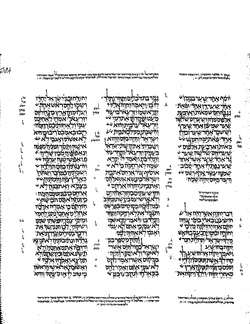Joel 1
Joel 1 is the first chapter of the Book of Joel in the Hebrew Bible or the Old Testament of the Christian Bible.[1][2] This book contains the prophecies attributed to the prophet Joel from the seventh century BCE,[3] and is a part of the Book of the Twelve Minor Prophets.[4][5]
| Joel 1 | |
|---|---|
← Hosea 14 | |
 | |
| Book | Book of Joel |
| Category | Nevi'im |
| Christian Bible part | Old Testament |
| Order in the Christian part | 29 |
Text
The original text was written in Hebrew language. This chapter is divided into 20 verses.
Textual witnesses
Some early manuscripts containing the text of this chapter in Hebrew are of the Masoretic Text tradition, which includes the Codex Cairensis (895 CE), the Petersburg Codex of the Prophets (916), Aleppo Codex (10th century), Codex Leningradensis (1008).[6] Fragments containing parts of this chapter in Hebrew were found among the Dead Sea Scrolls, including 4Q78 (4QXIIc; 75–50 BCE) with extant verses 10–20;[7][8][9][10] and 4Q82 (4QXIIg; 25 BCE) with extant verses 12–14.[7][8][11][12]
Ancient manuscripts in Koine Greek containing this chapter are mainly of the Septuagint version, including Codex Vaticanus (B; B; 4th century), Codex Sinaiticus (S; BHK: S; 4th century), Codex Alexandrinus (A; A; 5th century) and Codex Marchalianus (Q; Q; 6th century).[13]
Verse 1
- The word of the Lord that came to Joel the son of Pethuel.[14]
- The name "Joel" means "one to whom Jehovah is God," that is, "worshipper of Jehovah". The prophet seems to have belonged to Judah, as no reference occurs to Israel; whereas he speaks of Jerusalem, the temple, the priests, and the ceremonies, as if he were intimately familiar with them (compare Joel 1:14; 2:1, 15, 32; 3:1, 2, 6, 16, 17, 20, 21).[15]
Verse 4
What the chewing locust left, the swarming locust has eaten;
What the swarming locust left, the crawling locust has eaten;
And what the crawling locust left, the consuming locust has eaten.<ref>Joel 1:4</ref>
Hebrew text
יתר הגזם אכל הארבה ויתר הארבה אכל הילק ויתר הילק אכל החסיל׃
Transliteration
ye·ṯer ha·gā·zām ’ā·ḵal hā·’ar·beh,
wə·ye·ṯer hā·’ar·beh ’ā·ḵal ha·yā·leq,
wə·ye·ṯer ha·ye·leq ’ā·ḵal he·khā·sîl.
Cross reference: Joel 2:25.
Exact identity of these locusts is unknown, whether they represents "four varieties of insect" or "four various stages in the insect development" or "vernacular differences".[3]
| Hebrew; transliteration | English | Appearance in Hebrew Bible | Other Bible verses |
|---|---|---|---|
| גזם, gā·zām | chewing locust; gnawing locust; palmerworm; caterpillar | 3 | Joel 2:25; Amos 4:9 |
| ארבה, ’ar·beh | swarming locust; locusts; grasshoppers | 24 | Exodus 10:4, 12–14, 19; Leviticus 11:22; Deuteronomy 28:38; Judges 6:5; 7:12; 1 Kings 8:37; 2 Chronicles 6:28;Job 39:20; Psalm 78:46; 105:34; 109:23; Proverb 30:27; Jeremiah 46:23; Joel 2:25; Nahum 3:15, 17 |
| ילק, yā·leq | crawling locust; creeping locust ; locusts; young locusts; cankerworm | 9 | Psalm 105:34; Jeremiah 51:14, 27; Joel 2:25; Nahum 3:15, 16 |
| חסיל, khā·sîl | consuming locust; stripping locust; caterpillar; grasshopper | 6 | 1 Kings 8:37; 2 Chronicles 6:28; Psalm 78:46; Isaiah 33:4; Joel 2:25 |
See also
References
- Collins 2014.
- Hayes 2015.
- Keller 2007, p. 579.
- Metzger, Bruce M., et al. The Oxford Companion to the Bible. New York: Oxford University Press, 1993.
- Keck, Leander E. 1996. The New Interpreter's Bible: Volume: VII. Nashville: Abingdon.
- Würthwein 1995, pp. 35–37.
- Ulrich 2010, p. 598.
- Dead sea scrolls - Joel
- Fitzmyer 2008, p. 38.
- 4Q78 at the Leon Levy Dead Sea Scrolls Digital Library
- Fitzmyer 2008, p. 39.
- 4Q82 at the Leon Levy Dead Sea Scrolls Digital Library
- Würthwein 1995, pp. 73–74.
- Joel 1:1 NKJV
- Jamieson, Robert; Fausset, Andrew Robert; Brown, David. Jamieson, Fausset, and Brown's Commentary On the Whole Bible. "Joel 1". 1871.
Sources
- Collins, John J. (2014). Introduction to the Hebrew Scriptures. Fortress Press.CS1 maint: ref=harv (link)
- Coogan, Michael David (2007). Coogan, Michael David; Brettler, Marc Zvi; Newsom, Carol Ann; Perkins, Pheme (eds.). The New Oxford Annotated Bible with the Apocryphal/Deuterocanonical Books: New Revised Standard Version, Issue 48 (Augmented 3rd ed.). Oxford University Press. ISBN 978-0195288810.
- Fitzmyer, Joseph A. (2008). A Guide to the Dead Sea Scrolls and Related Literature. Grand Rapids, MI: William B. Eerdmans Publishing Company. ISBN 978-0802862419.CS1 maint: ref=harv (link)
- Hayes, Christine (2015). Introduction to the Bible. Yale University Press.CS1 maint: ref=harv (link)
- Keller, Carl-A. (2007). "28. Joel". In Barton, John; Muddiman, John (eds.). The Oxford Bible Commentary (first (paperback) ed.). Oxford University Press. pp. 578–581. ISBN 978-0199277186. Retrieved February 6, 2019.
- Ulrich, Eugene, ed. (2010). The Biblical Qumran Scrolls: Transcriptions and Textual Variants. Brill.CS1 maint: ref=harv (link)
- Würthwein, Ernst (1995). The Text of the Old Testament. Translated by Rhodes, Erroll F. Grand Rapids, MI: Wm. B. Eerdmans. ISBN 0-8028-0788-7. Retrieved January 26, 2019.
External links
| Wikisource has original text related to this article: |
| Look up Joel in Wiktionary, the free dictionary. |
- Jewish translations:
- Yoel – Joel chapter 1 (Judaica Press) translation with Rashi's commentary at Chabad.org
- Christian translations:
- Online Bible at GospelHall.org (ESV, KJV, Darby, American Standard Version, Bible in Basic English)
